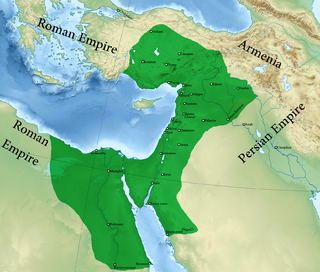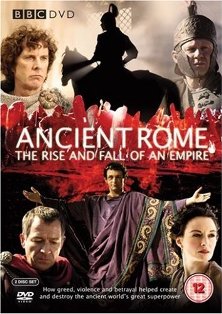
The History of the Decline and Fall of the Roman Empire is a six-volume work by the English historian Edward Gibbon. It traces Western civilization from the height of the Roman Empire to the fall of Byzantium in the fifteenth century. Volume I was published in 1776 and went through six printings. Volumes II and III were published in 1781; volumes IV, V, and VI in 1788–1789.
The 1st millennium BC, also known as the last millennium BC, was the period of time lasting from the years 1000 BC to 1 BC . It encompasses the Iron Age in the Old World and sees the transition from the Ancient Near East to classical antiquity.

The Crisis of the Third Century, also known as Military Anarchy or the Imperial Crisis, was a period in which the Roman Empire nearly collapsed. It ended due to the military victories of Aurelian and with the ascension of Diocletian and his implementation of reforms in 284, including the Tetrarchy.
Rome is the English form of the name of the capital city of Italy, and formerly capital of the Roman Empire and seat of the papacy, where it consistently has been called Roma.

Ostia Antica is a large archaeological site, close to the modern town of Ostia, that is the location of the harbour city of ancient Rome, 15 miles southwest of Rome. "Ostia" is a derivation of "os", the Latin word for "mouth". At the mouth of the River Tiber, Ostia was Rome's seaport, but due to silting the site now lies 3 kilometres from the sea. The site is noted for the excellent preservation of its ancient buildings, magnificent frescoes and impressive mosaics.

Classical antiquity is the period of cultural history between the 8th century BC and the 6th century AD centred on the Mediterranean Sea, comprising the interlocking civilizations of ancient Greece and ancient Rome known as the Greco-Roman world. It is the period in which both Greek and Roman societies flourished and wielded huge influence throughout much of Europe, Northern Africa, and Western Asia.
From its origin as a city-state on the peninsula of Italy in the 8th century BC, to its rise as an empire covering much of Southern Europe, Western Europe, Near East and North Africa to its fall in the 5th century AD, the political history of Ancient Rome was closely entwined with its military history. The core of the campaign history of the Roman military is an aggregate of different accounts of the Roman military's land battles, from its initial defense against and subsequent conquest of the city's hilltop neighbors on the Italian peninsula, to the ultimate struggle of the Western Roman Empire for its existence against invading Huns, Vandals and Germanic tribes. These accounts were written by various authors throughout and after the history of the Empire. Following the First Punic War, naval battles were less significant than land battles to the military history of Rome due to its encompassment of lands of the periphery and its unchallenged dominance of the Mediterranean Sea.

Roma Eterna is a science fiction fixup novel by American writer Robert Silverberg, published in 2003, which presents an alternative history in which the Roman Empire survives to the present day. Each of the ten chapters was first published as a short story, six of them in Asimov's Science Fiction, between 1989 and 2003.

The Fall of the Roman Empire is a 1964 American epic film directed by Anthony Mann and produced by Samuel Bronston, with a screenplay by Ben Barzman, Basilio Franchina and Philip Yordan. The film stars Sophia Loren, Stephen Boyd, Alec Guinness, James Mason, Christopher Plummer, Mel Ferrer, and Omar Sharif.

In modern historiography, ancient Rome refers to Roman civilization from the founding of the city of Rome in the 8th century BC to the collapse of the Western Roman Empire in the 5th century AD. It encompasses the Roman Kingdom, Roman Republic and Roman Empire until the fall of the western empire.

The causes and mechanisms of the fall of the Western Roman Empire are a historical theme that was introduced by historian Edward Gibbon in his 1776 book The History of the Decline and Fall of the Roman Empire. He started an ongoing historiographical discussion about what caused the fall of the Western Roman Empire. The traditional date for the end of the Western Roman Empire is 476 CE when the last Western Roman Emperor was deposed. Gibbon was not the first to speculate on why the empire collapsed, but he was the first to give a well-researched and well-referenced account. Many theories of causality have been explored. In 1984, Alexander Demandt enumerated 210 different theories on why Rome fell, and new theories have since emerged. Gibbon himself explored ideas of internal decline and of attacks from outside the empire.

The Palmyrene Empire was a short-lived breakaway state from the Roman Empire resulting from the Crisis of the Third Century. Named after its capital city, Palmyra, it encompassed the Roman provinces of Syria Palaestina, Arabia Petraea, and Egypt, as well as large parts of Asia Minor.

Kristian "Ditch" Davey is an Australian actor known for his role as Evan Jones in the Seven Network's Blue Heelers from 2001 to 2006, and for playing the lead role of Julius Caesar in Netflix Season 2: Master of Rome Roman Empire in 2018.

Ancient Rome: The Rise and Fall of an Empire is a 2006 BBC One docudrama series, with each episode looking at a different key turning point in the history of the Roman Empire. This docudrama focuses on the Latin western half of the Roman Empire.

Comparisons between the Roman and Han empires involve the comparative study of the roughly contemporaneous Roman Empire and the Han dynasty of early imperial China. At their peaks, both states controlled a large portion of the world population and produced political and cultural legacies that endure to the modern era; comparative studies largely focus on their similar scale at their pinnacles and on parallels in their rise and decline. The Han and Roman empires disintegrated and fell at roughly the same time in the second century A.D., but the Chinese empire came together again under the Sui and Tang dynasties.
Barbarians Rising is an American docudrama television series executive produced by Adam Bullmore and produced by Chloe Leland and Michael Waterhouse that airs on History Channel. It premiered on June 6, 2016.

Roman Empire is a television docudrama based on historical events of the Roman Empire. The show is in the anthology format with each season presenting an independent story. Season 1, "Reign of Blood", is a six-part story about Emperor Commodus. Jeremiah Murphy and Peter Sherman collaborated on writing the first season, with Richard Lopez directing. It premiered on Netflix on November 11, 2016. Season 2, "Master of Rome", is a five-part story about the rise of Dictator Julius Caesar and the fall of the Roman Republic. Season 2 premiered on July 27, 2018. Season 3 "The Mad Emperor" premiered on Netflix on April 5, 2019, and is a four-part story about Emperor Caligula.
Fall of Rome may refer to:













